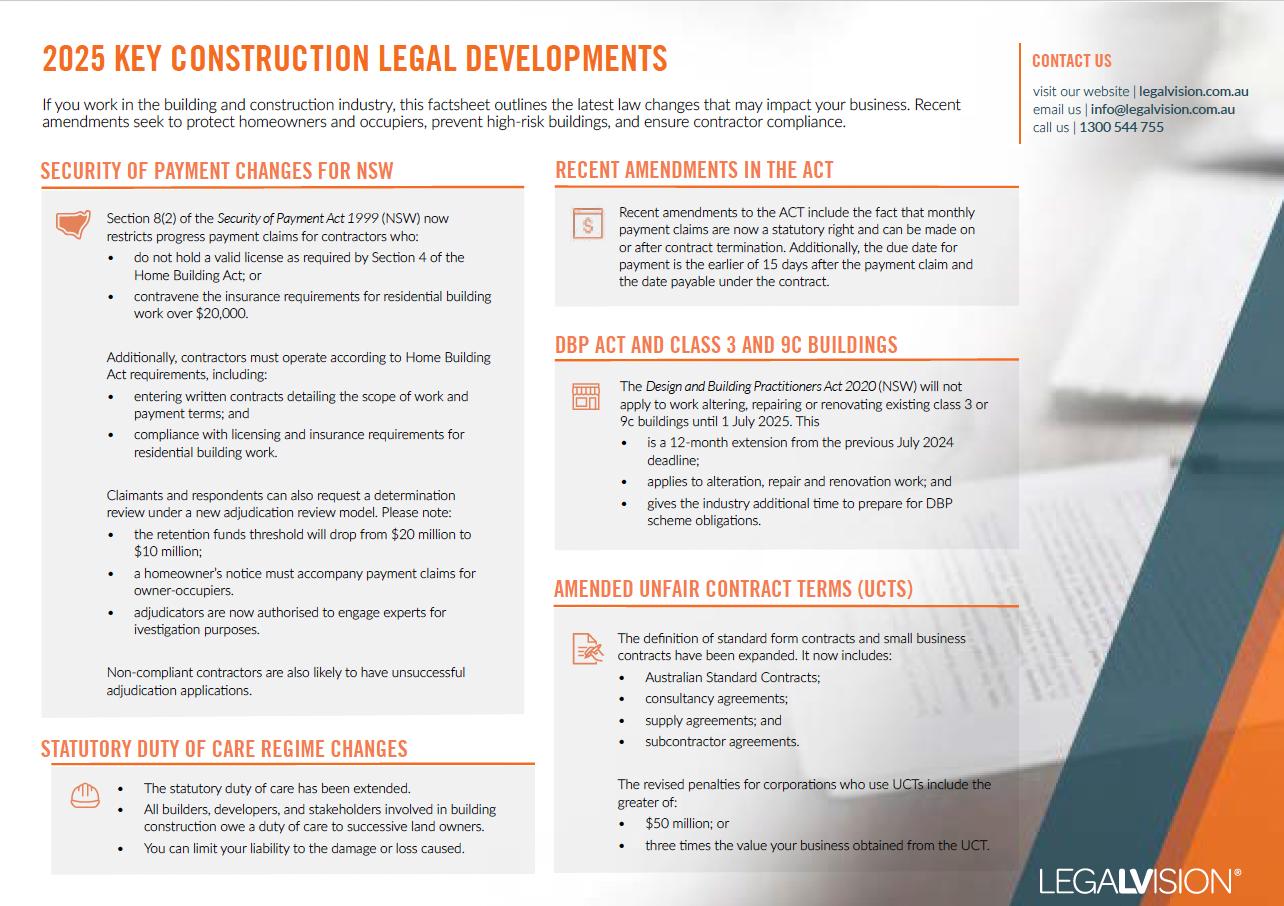In Short
-
SOPA is a state-based framework ensuring timely payments in the construction industry; each jurisdiction has its own legislation.
-
Key differences include varying payment claim timeframes and adjudication processes across states.
-
Understanding local SOPA provisions is crucial for compliance and effective dispute resolution.
Tips for Businesses
Familiarise yourself with the specific SOPA legislation in your state or territory to ensure compliance. Timely submission of payment claims and understanding response deadlines can help prevent disputes. Consult legal professionals to navigate the complexities of SOPA across different jurisdictions effectively.
The Security of Payment Act (SOPA) legislation plays a crucial role in ensuring fair and timely payments within Australia’s construction industry. However, the implementation of SOPA varies across different states and territories, creating a complex landscape for industry participants to navigate. This article provides an overview of the key payment terms and requirements under SOPA across Australian jurisdictions.
Overview of SOPA Legislation
SOPA was introduced to address significant issues plaguing the construction industry, particularly delayed payments and unfair practices that often left subcontractors and suppliers financially vulnerable. SOPA is not a federal law but rather a framework implemented individually by each state and territory. While the core purpose of ensuring timely payments remains consistent, specific provisions such as adjudication procedures, timelines, and claim requirements differ between jurisdictions.
The first SOPA legislation was introduced in New South Wales in 1999, serving as a model for other states and territories. Over the past two decades, each jurisdiction has tailored its legislation to address local industry needs and challenges. This evolution has led to a diverse legislative landscape, with some jurisdictions opting for more stringent provisions while others maintain a more flexible approach.
Key SOPA Provisions Across Jurisdictions
| State | NSW | Vic | Qld | WA | SA |
| Legislation | Building and Construction Industry Security of Payment Act 1999 | Building and Construction Industry Security of Payment Act 2002 | Building Industry Fairness (Security of Payment) Act 2017 | Building and Construction Industry (Security of Payment) Act 2021 | Building and Construction Industry Security of Payment Act 2009 |
| Payment Claim Timeframe | Up to 12 months after work completion. | Up to 3 months after work completion. | Up to 6 months after work completion. | Up to 6 months after work completion. | Up to 6 months after work completion. |
| Payment Schedule Response Time | 10 business days (or shorter if specified in the contract). | 10 business days (or as specified in the contract). | 15 business days (or as specified in the contract). | 15 business days (or as specified in the contract). | 15 business days (or as specified in the contract). |
| Adjudication Application Deadline | 10 business days after the payment schedule is received. | 10 business days after the payment schedule is received. | 30 business days after the payment schedule is received. | 20 business days after the payment dispute arises. | 15 business days after the payment schedule is received. |
Recent Developments and Future Trends
In recent years, there has been a push towards greater harmonisation of SOPA legislation across Australia. The Murray Review, commissioned by the federal government in 2017, recommended a more unified approach to security of payment laws. While progress has been slow, some jurisdictions have begun to align their legislation more closely with the recommendations.

If you work in the building and construction industry, this factsheet outlines the latest law changes that may impact your business.
Key Differences and Considerations
Some key considerations are:
- Timeframes: The allowable period for submitting payment claims varies significantly, from 3 months in Victoria to 12 months in New South Wales.
- Response Times: Payment schedule response times range from 10 to 15 business days across jurisdictions, with some allowing for contract-specific timelines.
- Adjudication Deadlines: The window for initiating adjudication processes differs, with Queensland allowing up to 30 business days and Victoria as little as 5 business days in certain circumstances.
You should keep the following practical implications in mind:
- Cross-Jurisdictional Operations: Companies operating across multiple states must be aware of and comply with varying SOPA requirements in each jurisdiction.
- Contract Drafting: Contracts should be carefully drafted to align with the applicable SOPA legislation, particularly regarding payment terms and dispute resolution processes.
- Record Keeping: Robust documentation practices are essential to support payment claims and potential adjudication proceedings.
- Training and Compliance: Staff involved in payment processes should be trained on the specific SOPA requirements in relevant jurisdictions.
Key Takeaways
While SOPA legislation across Australia shares a common goal of ensuring fair and timely payments in the construction industry, the specific requirements and processes vary significantly between jurisdictions. Industry participants must be vigilant in understanding and complying with the applicable SOPA provisions in each state or territory where they operate, in order to effectively manage payment processes and mitigate disputes.
If you have any questions, our experienced construction lawyers can assist as part of our LegalVision membership. For a low monthly fee, you will have unlimited access to lawyers to answer your questions and draft and review your documents. Call us today on 1800 534 315 or visit our membership page.
Frequently Asked Questions
SOPA (Security of Payments Act) ensures that contractors and subcontractors in the construction industry are paid on time. It’s important because each state or territory has different provisions, and non-compliance could lead to payment disputes and legal issues.
To ensure compliance, research and understand the specific SOPA regulations in each jurisdiction where your business operates. Consulting with legal experts can help navigate the differences in payment claim deadlines, adjudication processes, and other critical aspects.
We appreciate your feedback – your submission has been successfully received.












